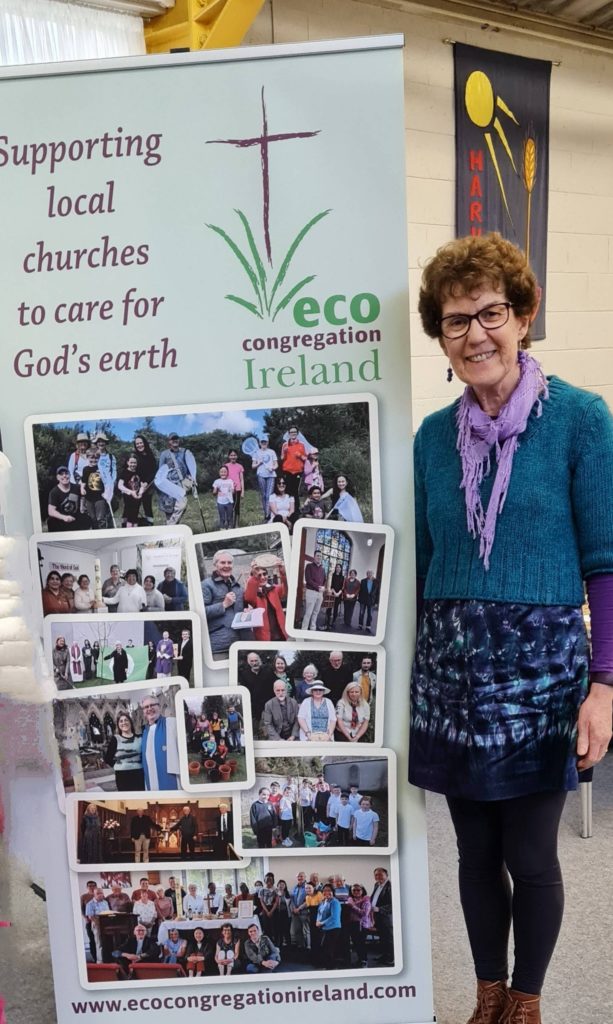Maureen Rowan – Member of CSR Sub-Group on Environmental Policy and Methodist Representative to Eco Congregation Ireland

It was a coincidence that Manchán Magan’s four-part series on RTE ‘Europe by Train’ screened the night before I set out from Dublin to Stockholm over land and sea. Environmental concerns were the focus, but Manchán was also exploring the romance and spontaneity of slow travel. I simply wanted to see could I visit my son, who is based in Stockholm, in a more sustainable way.
In the months before the journey, my colleagues and I on the Council on Social Responsibility Sub-Group had been brainstorming for the new Environmental Policy. What Conference approved can be viewed at https://irishmethodist.org/csr-archive (Environmental Policy). Conference did not say ‘Thou shalt not fly’ or prescribe any lifestyle plans. Individual conscience, however, to me, seemed to call for an exploration of every possibility to reduce personal carbon emissions.
John Wesley rode 250,000 miles on horseback, and took a four month sailing ship journey to America. His carbon emissions were probably zero, even allowing for the limited amount of methane from horse manure.
There was little data available on the environmental impact of going on horseback to Stockholm. Figures for other transport modes were plentiful however.* A passenger travelling on a short haul flight generates an equivalent of 151g of CO2 equivalents per kilometre, but on the Eurostar this reduces to just 4g. The figure for a passenger travelling by bus is 97g, by train 35g, and by ferry 19g.
On my overland trip from Dublin to Stockholm I would emit approximately 110 kg of CO2 equivalents as against 331kg** if I took a one-way flight. There were better things I could do, according to other data. Eating a plant-based diet and living car-free would save 3.2 tonnes of CO2 equivalents per year. I am not averse to these adjustments, but they require transitions in family and community life. Exploring overland travel seemed a more realistic way to begin, especially since I could travel with my son on his journey back from Ireland.
In my aging state, a key decision would be where to sleep en route, but my son had a different plan for me. He felt I should experience the overnight Flixbus, the only mode of travel affordable to many migrants who have to traverse the continent for work. So it was Sail and Rail to London, Eurostar to Brussels, a Flixbus to Hamburg, a break in Hamburg, then a train to Stockholm. The whole journey, including the break, was to take from 8am on Monday to 8.30pm on Wednesday. The total cost, at the most economical rates, would be €180 per person, one way. A return flight, off season, booked well in advance, could be available for €130.
There were highs and lows. The ferry felt liberating compared to flying. Within an hour of leaving the house we were at sea. A young friend of my son’s happened to be on the same journey to London so the time flew by in extended conversations we would never have time for at home. I am a fussy eater so another benefit was being able to bring my own favourite foods and avoid the over processed and expensive offerings on boat and train. The euphoria continued through London and on the Eurostar as far as Brussels. By Brussel-Midi at 11pm the mood began to change. The station was deserted, and the toilets were guarded by a homeless woman in need of cash. Travelling light, I had only a card so I could help neither her nor myself. The departure point for the Flixbus was on the side of a dark street across from the station where shadowy figures were hanging around, either waiting or doing deals.
The night bus filled to capacity. Ages and ethnicities were diverse and conversations were loud, both in person and on mobile phones which rang throughout the night. The loudest noise however came from the coughing, nose blowing man in front of whom we had the misfortune to be sitting. He looked young and healthy which must have given him the endurance to expectorate all the way from Brussels to Hamburg. If this was Covid, we were all doomed, thankfully it wasn’t. Sleep seemed an impossibility but somewhere after Bremen when some passengers alighted or could take no more, I found an extra seat and must have nodded off. Dawn broke among fields of maize in northern Germany.
Renewed by the break at Hamburg, we boarded the train for Copenhagen next morning at 9am. By 8pm that night, we were thirty minutes from Stockholm. What could possibly go wrong? A train ahead could break down was what, and three hours later we were still on the tracks. By now I had read everything, observed everything, talked about everything and could content myself with nothing. We finally made it to my son’s apartment by midnight.
Would I do it all again? Was it worth it environmentally, personally, financially? Yes, I would like to continue to explore the possibilities, if time and finance allows. Next time a sleeper train would be a alternative to the Flixbus . However that could bring the total cost to over €300 one way. Major system changes are needed to reduce costs relative to flying.
If these system changes are not made, future generations may have to return to horseback!
Source for emissions data:
*https://ourworldindata.org/travel-carbon-footprint. 2023
** https://curb6.com/footprint/flights/stockholm-arn/dublin-dub
Maureen also writes weekly pieces for Methodist Centenary Church’s Announcements Sheet and these are are available here >> https://www.methodistcentenary.ie/Groups/425058/Eco_Notes_Archive.aspx
